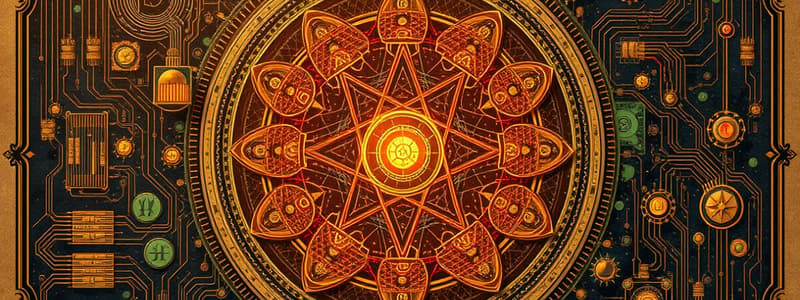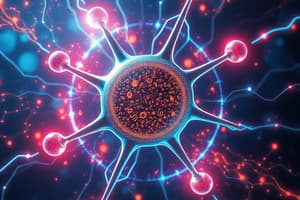Podcast
Questions and Answers
What is an ammeter?
What is an ammeter?
- An instrument for measuring electrical current (correct)
- A device used to step voltage up or down
- An electromagnetic coil
- A measurement of electrical power
What is the term for the flow of electrons in a circuit?
What is the term for the flow of electrons in a circuit?
current
What does one volt represent?
What does one volt represent?
- The energy used to perform one joule of work
- The force required to produce a current of one ampere through a resistance of one ohm (correct)
- A unit for measuring electrical power
- The amount of electrical charge carried by one coulomb
What is the basic unit of measurement for electrical power?
What is the basic unit of measurement for electrical power?
What is a circuit?
What is a circuit?
What is the term for a material through which it is easy to maintain an electric current?
What is the term for a material through which it is easy to maintain an electric current?
An insulator is a material that is easy to conduct electric current.
An insulator is a material that is easy to conduct electric current.
What is resistance measured in?
What is resistance measured in?
What does an ohmmeter measure?
What does an ohmmeter measure?
What is Ohm's Law?
What is Ohm's Law?
What is a battery?
What is a battery?
What is voltage?
What is voltage?
Study Notes
Electrical Circuits Key Concepts
- Ammeter: Measures electrical current in amperes.
- Current: Flow of electrons, quantified in amperes.
- Volt: Force needed to generate one ampere through one ohm of resistance.
- Ampere: Current produced when one volt is applied across one ohm.
- Joule of Work: Energy transferred when one coulomb of electricity moves across a one-volt potential difference.
- Coulomb: Unit for measuring electric charge magnitude.
- Voltage: Driving force for current flow in a circuit.
- Watt: Fundamental unit for measuring electrical power.
Atomic Structure in Circuits
- Atom: Smallest particle of an element retaining its characteristics.
- Nucleus: Central part of an atom.
- Protons: Positively charged particles within an atom.
- Neutrons: Neutral particles found in the nucleus of atoms.
- Valence Shell: Outermost electron ring around an atom's nucleus.
- Electrons: Negatively charged particles orbiting the nucleus.
Matter and Units
- Matter: Anything with mass that occupies space.
- Kilo: Represents one thousand.
- Mega: Represents one million.
Electrical Components
- Battery: Source of DC voltage converting chemical energy to electrical energy.
- Circuit: Continuous path enabling current flow.
- Conductor: Material facilitating electric current; low resistance.
- Insulator: Material hindering electric current; high resistance.
Measurement Units
- Ohm: Basic unit measuring electrical resistance.
- Ohmmeter: Tool for assessing resistance values.
Fundamental Principles
- Ohm's Law: Governs the relationship between current, voltage, and resistance.
- Electrical Power: Rate of work being performed or energy being used.
- Resistance: Property opposing current flow, measured in ohms.
- Resistor: Component that restricts current in a DC circuit.
Circuit Configurations
- Schematic: Symbolic drawing representing electrical circuits.
- Series Circuit: Circuit with a singular pathway for current flow.
- Voltage Drop: Variation in voltage across a component due to current and resistance.
Electromechanical Devices
- Relay: Device that uses a coil to switch contacts mechanically.
- Transformer: Adjusts voltage levels using coils of wire around a core.
- Solenoid: Electromagnetic coil acting to control mechanical devices like valves.
Power Dynamics
- Power: Rate at which electrical work is done, measured in watts.
Studying That Suits You
Use AI to generate personalized quizzes and flashcards to suit your learning preferences.
Description
Test your understanding of key concepts in electrical circuits and atomic structure. This quiz covers important terms such as ammeter, joule, and the components of an atom, including protons, neutrons, and electrons. Challenge yourself with questions designed to reinforce your knowledge in these fundamental areas.



